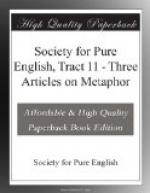Certainly we cannot detect the suggested lack of warmth in the speech as it is printed, for in his speech, as in the Prime Minister’s, it seems to us that (if we may change the metaphor) exactly the right note was struck.
We may, on the one hand, receive into our gill its precise content of the complex mixture that fills the puncheon of the whole world’s literature, on the other—to change the metaphor—our few small strings may thrill in sympathetic harmony to some lyrical zephyrs and remain practically unresponsive to the deep-sea gale of Aeschylus or Dante.
Why, yes, gentlemen, you may change your metaphors, if it seems good to you, but you may also be pretty sure that, if you feel the necessity of proclaiming the change, you had better have abstained from it.
Two of the trump cards played against the Bill are (1) that ’it makes every woman who pays a tax-collector in her own house’, and (2) that ’it will destroy happy domestic relations in hundreds of thousands of homes’; if we may at once change our metaphor, these are the notes which are most consistently struck in the stream of letters, now printed day by day for our edification in the Mail. This writer need not have asked our leave to change from cards to music; he is within his rights, anyhow, and the odds are, indeed, that if he had not reminded us of the cards we should have forgotten them in the intervening lines, but how did a person so sensitive to change of metaphor fail to reflect that it is ill playing the piano in the water? ‘A stream of letters’, it is true, is only a picturesque way of saying ‘many letters’, and ordinarily a dead metaphor; but once put your seemingly dead yet picturesque metaphor close to a piano that is being played, and its notes wake the dead—at any rate for readers who have just had the word metaphor called to their memory.—H.W. FOWLER.
III. DEAD METAPHORS
Metaphor becomes a habit with writers who wish to express more emotion than they feel, and who employ it as an ornament to statements that should be made plainly or not at all. Used thus, it is a false emphasis, like architectural ornaments in the wrong place. It demands of the reader an imaginative effort where there has been no such effort in the writer, an answering emotion where there is none to be answered. And the reader gets the habit of refusing such effort and such emotion; he ceases even to be aware of metaphors that are used habitually. He may not consciously resent them; but unconsciously his mind is wearied by them as the eye by advertisements often repeated. By their sameness they destroy expectation so that, even if the writer says anything in particular, it seems to be all generalities.
Here is an instance of habitual metaphor, not manufactured for this tract, but taken from an article by a well-known writer. He is speaking of the career of Mr. Lloyd George:




